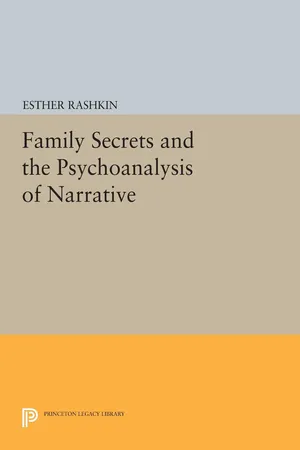
- 222 pages
- English
- PDF
- Available on iOS & Android
Family Secrets and the Psychoanalysis of Narrative
About this book
Family Secrets and the Psychoanalysis of Narrative is the first book to explore the implications of the psychoanalytic theory of the phantom for the study of narrative literature. A phantom is formed when a shameful, unspeakable secret is unwittingly transmitted, through cryptic language and behavior, transgenerationally from one family member to another. The "haunted" individual to whom the "encrypted" secret is communicated becomes the unwitting medium for someone else's voice--and the result is speech and conduct that appear incongruous or obsessive in a variety of ways. Through close readings of texts by Conrad, Villiers de l'Isle-Adam, Balzac, James, and Poe, Esther Rashkin reveals how shameful secrets, concealed within the unspoken family histories of fictive characters, can be reconstructed from their linguistic traces and can be shown not only to drive the characters' speech and behavior but also to generate their narratives. First articulated by the French psychoanalysts Nicolas Abraham and Maria Torok, the theory of the phantom here represents a radical departure from Freudian, Lacanian, and other psychoanalytic approaches to literary interpretation. In Rashkin's hands, it also provides a response to structuralist and poststructuralist critiques of character analysis, an alternative to deconstructive strategies of reading, and a new vantage point from which to consider problems of intertextuality, "authorship," and the formation and origins of narrative.
Originally published in 1992.
The Princeton Legacy Library uses the latest print-on-demand technology to again make available previously out-of-print books from the distinguished backlist of Princeton University Press. These editions preserve the original texts of these important books while presenting them in durable paperback and hardcover editions. The goal of the Princeton Legacy Library is to vastly increase access to the rich scholarly heritage found in the thousands of books published by Princeton University Press since its founding in 1905.
Tools to learn more effectively

Saving Books

Keyword Search

Annotating Text

Listen to it instead
Information
Table of contents
- Cover
- Contents
- Acknowledgments
- Note on Documentation
- Introduction - Character Analysis, Unspeakable Secrets, and the Formation of Narrative
- 1. For a New Psychoanalytic Literary Criticism: The Works of Abraham and Torok
- 2. The Ghost of a Secret: Psychoanalytic Allegory in Joseph Conrad's the Secret Sharer
- 3. The Interred Sign: L'intersigne by Auguste De Villiers De L'lsle-Adam
- 4. Legacies of Gold: Honoré de Balzac's Facino Cane
- 5. In the Mind's I: The Jolly Corner of Henry James
- 6. A Meeting of the Minds: Edgar Allan Poe's the Fall of the House of Usher
- Conclusion
- Notes
- Index
Frequently asked questions
- Essential is ideal for learners and professionals who enjoy exploring a wide range of subjects. Access the Essential Library with 800,000+ trusted titles and best-sellers across business, personal growth, and the humanities. Includes unlimited reading time and Standard Read Aloud voice.
- Complete: Perfect for advanced learners and researchers needing full, unrestricted access. Unlock 1.4M+ books across hundreds of subjects, including academic and specialized titles. The Complete Plan also includes advanced features like Premium Read Aloud and Research Assistant.
Please note we cannot support devices running on iOS 13 and Android 7 or earlier. Learn more about using the app